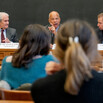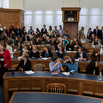Ethics Bureau Has Winning Argument in SCOTUS Case

On May 14, 2018, the U.S. Supreme Court threw out a Louisiana death row inmate’s conviction for a 2008 triple murder, siding in favor with an argument put forth by the Ethics Bureau at Yale. The clinic has been advocating for the defendant in the case, Robert McCoy, for several years.
In a 6-3 decision by the High Court, justices ruled that McCoy’s lawyer violated his client’s rights by ignoring his objections and telling the jury that his client had killed his victims. The decision said that McCoy’s Sixth Amendment right to legal representation at trial was violated.
“We are very pleased see the Supreme Court reaffirm this core principle by holding that Mr. McCoy, not his lawyer, ultimately has the authority to decide whether to concede guilt,” said Elizabeth Villarreal ’19, a clinic student who worked on the case. “Because of this decision, Mr. McCoy will now receive a new trial, where he will be represented by a legal team that will honor his objective for the representation—maintaining his innocence.” Three other students were involved in the case, including David Walchak ’18, Jude Foo ’18, and Will Bekker ’18.
Visiting Lecturer in Law Larry Fox, who runs the Ethics Bureau clinic, said the McCoy case presented a fundamental professional responsibility question of how to properly allocate responsibility between a lawyer and their client.
“The client is the principal; the lawyer is the agent,” explained Fox. “The client gets to decide the objectives of the representation. Consistent with that principle, EBaY took the position that conceding guilt was the equivalent of entering a guilty plea, which McCoy insisted that he would never plead guilty.”
Last year, students filed an amicus brief with the Supreme Court building the case for why McCoy had ineffective counsel and should have a right to a new trial. It was the third amicus brief the clinic had filed in the case.
McCoy was indicted by a Louisiana grand jury in 2008 on three counts of murder. After the State of Louisiana notified McCoy of its intent to seek the death penalty against him on these charges, he entered a plea of not guilty and told his defense counsel of his wish to go to trial to prove his innocence, the clinic said. However, despite McCoy’s unequivocal instructions, his defense counsel proceeded to concede guilt at trial. McCoy was ultimately convicted and sentenced to death.
McCoy appealed his conviction and sentence to the Louisiana Supreme Court shortly after his conviction. The clinic filed an amicus brief with the lower court in support of McCoy at that time. Following the lower court decision, McCoy filed a cert petition with the U.S. Supreme Court, which was granted in September 28, 2017.
The Ethics Bureau advises lawyers on how to proceed when faced with violations of the Model Rules of Professional Conduct and other ethical dilemmas. Students draft amicus briefs in cases involving professional responsibility; help people with ineffective assistance of counsel claims; and offer ethics advice to nonprofit organizations. A weekly class on professional responsibility is also part of the bureau.


